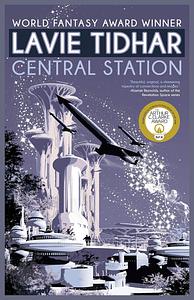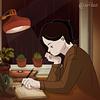Take a photo of a barcode or cover
This book will probably appeal to fans of Philip K. Dick's more abstract novels, or for people who like their sci-fi to straddle a line with mainstream introspective literary fiction. The writing is good, and the world is clearly well-envisioned by Tidhar, but I didn't find the style of storytelling engaging.
I never figured out what the central plot was intended to be and none of the characters felt like real people with emotions or connections to the world. The whole thing had that herky-jerky dreamscape atmosphere I associated with Dick's writing, where all of the meaningful plot points and human interactions happen off the page, so all you get is characters responding to stimuli that neither you nor they really understand.
I never figured out what the central plot was intended to be and none of the characters felt like real people with emotions or connections to the world. The whole thing had that herky-jerky dreamscape atmosphere I associated with Dick's writing, where all of the meaningful plot points and human interactions happen off the page, so all you get is characters responding to stimuli that neither you nor they really understand.
See full review at https://bookstechandocd.wordpress.com/2016/08/16/just-finished-central-station-by-lavie-tidhar/
One of the defining features of Central Station is its structure. Nearly every chapter presents a new story, or a snapshot of a new character's life, and yet each new chapter is somehow connected to the character, or situation, the reader has just left behind in the previous chapter. Each chapter adds new layers to the readers understanding of Lavie Tidhar's fictional world, and one of the joys of this book is the slow accumulation of detail which builds up into a rounded, multi-faceted picture of life in Tel Aviv, and the lives of the characters that the author introduces. And while the novel deliberately, unrelentingly moves from one character to the next, as the chapters progress, it becomes clear that a particular set of characters are the book's backbone.
It is quite a feat to build a story which feels so coherent from a set of chapters that have all appeared individually, in some form, in other publications. It is another feat to present a story which leaves plenty unsaid, and encourages the reader's imagination to expand into the space offered, without losing the reader altogether. Tidhar pulls off both with exceptional skill, although I admit, at times, Tidhar's choice of structure sometimes left me wanting. While all the stories collected as part of this novel are compelling, I imagine, like me, every reader will have their favourite characters, and perhaps will wish they had been granted more time with them. And the task of forging a conclusion for a story that deliberately avoids settled endings, or complete stories, for its many characters is also a tricky one. In the end, Central Station's ending had a little bit too much over-aweing science fiction mysticism for my personal taste but your mileage may vary.
However, Central Station is an intriguing novel, and reading it has encouraged me to pick up a couple of the author's other novels. Tidhar packs so much fresh science fiction into Central Station; genetic manipulation, discarded robot soldiers, mind viruses, gods in scrap heaps, and robot religion. And it's impossible not to be energised by his close up examinations of how science fiction realistically affects the characters who live in this world. He has a light, perceptive touch for creating simple emotion born from complex psychology, and setting that against a background of ordinary, mundane life. Tidhar's talent for making those very ordinary elements sing, and stand out, even when they're surrounded by so much otherworldly invention is impressive, and makes Central Station well worth any reader's time.
It is quite a feat to build a story which feels so coherent from a set of chapters that have all appeared individually, in some form, in other publications. It is another feat to present a story which leaves plenty unsaid, and encourages the reader's imagination to expand into the space offered, without losing the reader altogether. Tidhar pulls off both with exceptional skill, although I admit, at times, Tidhar's choice of structure sometimes left me wanting. While all the stories collected as part of this novel are compelling, I imagine, like me, every reader will have their favourite characters, and perhaps will wish they had been granted more time with them. And the task of forging a conclusion for a story that deliberately avoids settled endings, or complete stories, for its many characters is also a tricky one. In the end, Central Station's ending had a little bit too much over-aweing science fiction mysticism for my personal taste but your mileage may vary.
However, Central Station is an intriguing novel, and reading it has encouraged me to pick up a couple of the author's other novels. Tidhar packs so much fresh science fiction into Central Station; genetic manipulation, discarded robot soldiers, mind viruses, gods in scrap heaps, and robot religion. And it's impossible not to be energised by his close up examinations of how science fiction realistically affects the characters who live in this world. He has a light, perceptive touch for creating simple emotion born from complex psychology, and setting that against a background of ordinary, mundane life. Tidhar's talent for making those very ordinary elements sing, and stand out, even when they're surrounded by so much otherworldly invention is impressive, and makes Central Station well worth any reader's time.
I enjoyed the world building in this book, but didn't like lack of plot. As previous reviewers have stated the book is more like loosely connected short stories then a novel.
This book felt very disjointed at first, and I had trouble picking it back up again without getting lost each time I put it down. It looks like this is in part because it was built out of multiple short stories that were modified to work together. It also had a vaguely literary feel to it, though, and there were some intriguing ideas like a digital version of a vampire. I also really appreciated the various religions, both old and new, and the way Israeli culture and references to Israel/Judaism were peppered throughout.
Full review at my blog.
Central Station is a commercial space hub far several hundreds years in the future set between Tel Aviv and Jaffa. It is a rich atmospheric universe of its own, filled with an astonishing motley crew of characters from two families: There is the boy Kranki blending reality and virtuality while playing with his virtual friend, an "alte-zachen-man" who sells discarded things, Carmel the data vampire, Motl the cyborged ex-soldier who falls in forbidden love with the captain of a MMORPG guild Isobel Chong, one Reverend Roboter “Patch-It” from the Robotic Church, old Vladimir Chong suffering from memory cancer, and in the background lurking the Others which are uploaded humans and post-singularity A.I.s connected to humans through the Conversation, just to name a few.
Central Station is a commercial space hub far several hundreds years in the future set between Tel Aviv and Jaffa. It is a rich atmospheric universe of its own, filled with an astonishing motley crew of characters from two families: There is the boy Kranki blending reality and virtuality while playing with his virtual friend, an "alte-zachen-man" who sells discarded things, Carmel the data vampire, Motl the cyborged ex-soldier who falls in forbidden love with the captain of a MMORPG guild Isobel Chong, one Reverend Roboter “Patch-It” from the Robotic Church, old Vladimir Chong suffering from memory cancer, and in the background lurking the Others which are uploaded humans and post-singularity A.I.s connected to humans through the Conversation, just to name a few.
It has been a full week since I completed this thriller, and its vivid images and concepts of future bionic life (and death) haunt me daily. This book imagines today's technologies stretched to their logical extreme, to breaking point. Breathlessly. Strangely, the only unbelievable aspect (for me) was how gorgeous and alluring all the female protagonists were...
Nothing was happening so I gave up.
The concept was really cool and I think the cultures that followed make sense. But it wasn't fleshed out enough to draw me into the feel of it. There were a lot of characters, also not really fleshed out enough, and I didn't bond with them. Also, not enough action/plot development for my taste. Oh well!
The concept was really cool and I think the cultures that followed make sense. But it wasn't fleshed out enough to draw me into the feel of it. There were a lot of characters, also not really fleshed out enough, and I didn't bond with them. Also, not enough action/plot development for my taste. Oh well!
An odd book with amazing world building and confusing bits and pieces of plot. I both like and dislike the disjointedness of the narrative. 3.5 stars.



